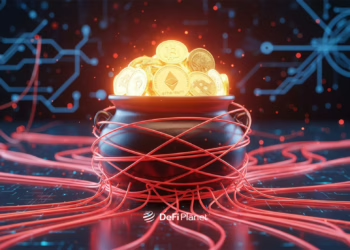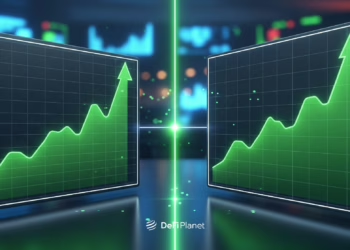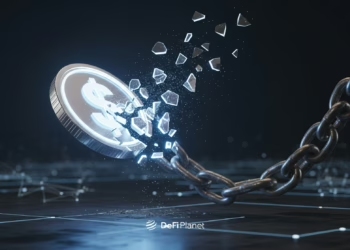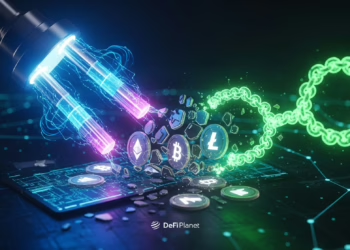Last updated on September 22nd, 2025 at 05:36 pm
Crypto staking plays a central role in the DeFi ecosystem. It allows token holders to lock up their assets to support network security and operations in exchange for passive rewards, an alternative to traditional yield-generating investments. Staking is vital in proof-of-stake (PoS) blockchains like Ethereum, Solana, and Cardano, where validators are chosen based on how much crypto they stake.
Recently, the US SEC has taken aim at staking services offered by centralized platforms. New regulations and enforcement actions require these platforms to register staking products as securities, citing investor protection concerns. These changes have raised alarm bells across the crypto space, with critics warning that they could push staking further into decentralization or out of US markets entirely.
This raises a pressing question: Are the SEC’s new crypto staking rules a step toward safer investing, or do they risk suffocating DeFi’s growth and innovation?
What Are the New SEC Staking Rules?
On May 29, 2025, the SEC’s Division of Corporation Finance released new guidance clarifying that not all crypto staking activities are considered securities under US law.
According to the statement, self-staking, delegated (non-custodial) staking, and custodial staking, when directly tied to a proof-of-stake network’s consensus process, do not qualify as investment contracts under the Howey test.
In these cases, crypto staking rewards are treated as compensation for helping secure the network, not as profits derived from someone else’s managerial efforts.
However, the SEC made it clear that staking-related products, such as bundled yield services, guaranteed return platforms, and liquid staking with unbonding features, may still be classified as securities.
These offerings often involve pooled assets and profit expectations based on the work of others, making them subject to securities regulation and potential enforcement.
Other Key Regulations
-
Registration requirements:

Providers of allowed staking services, including custodial and non-custodial staking, do not need to register as securities under current law, provided they operate within defined protocol-staking frameworks.
-
Restrictions on yield-promising platforms:
The SEC continues to scrutinize and potentially regulate products that promise regulated returns through crypto staking or similar services, such as “staking-as-a-service” schemes that involve managerial input or guarantees.
-
Disclosures and custodial obligations:
While not requiring formal securities registration, the SEC emphasizes that custodians must maintain user control, refrain from using assets for business purposes, and clearly disclose crypto staking terms, including risks like slashing, unbonding periods, and fees
The SEC’s Stated Rationale
The SEC says its new crypto staking regulations are aimed at protecting investors and bringing greater oversight to an area it sees as vulnerable to abuse and confusion.
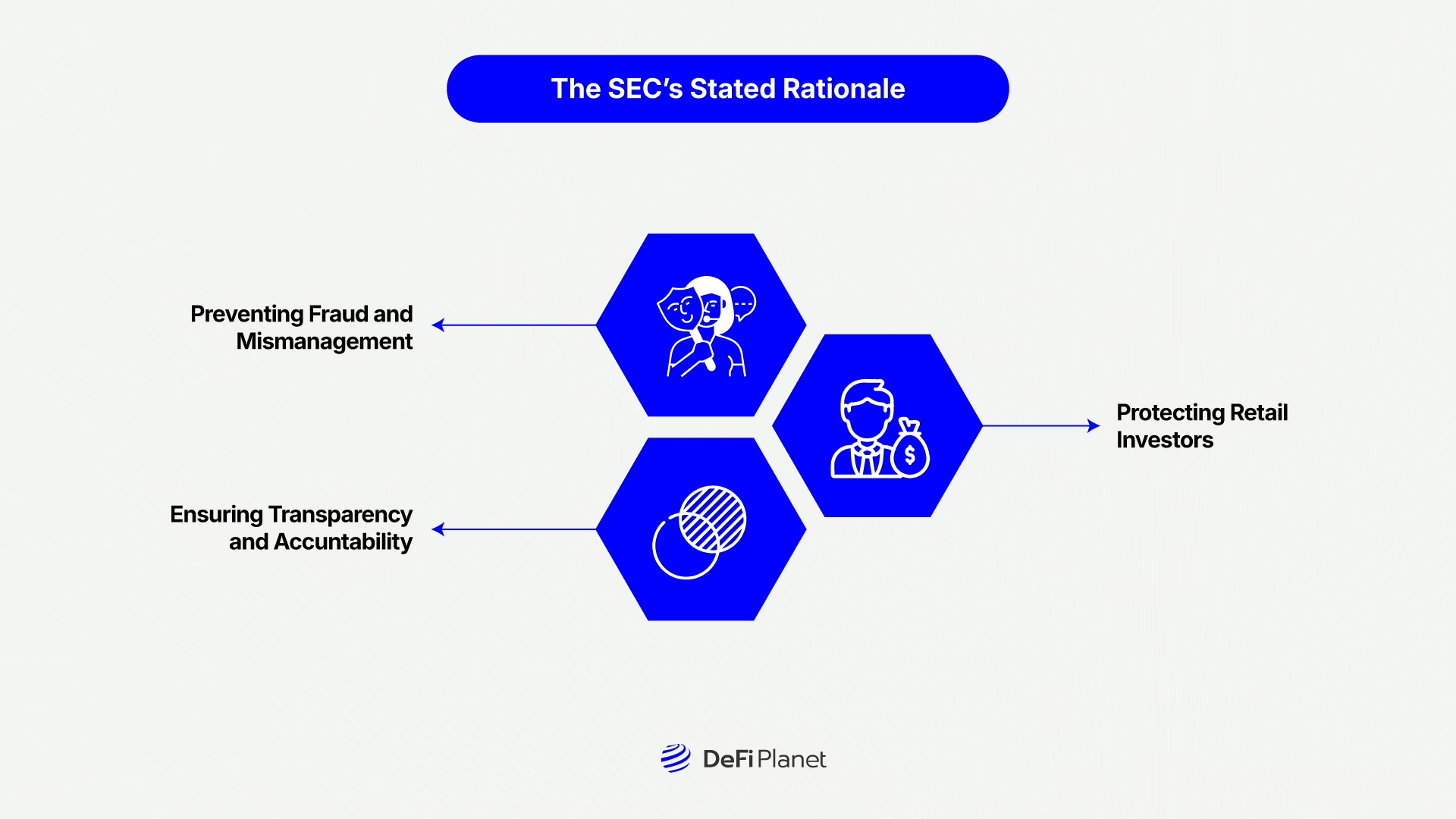
Preventing fraud and mismanagement
The SEC’s first major concern with crypto staking services is the potential for fraud and mismanagement. In recent enforcement actions, such as its settlement with Kraken, the agency emphasized that many staking-as-a-service providers operate without appropriate oversight or accountability.
By applying securities laws, the SEC aims to ensure that companies offering crypto staking products are not misleading investors or misusing funds.
Ensuring transparency and accountability
Another central goal is improving transparency. The SEC argues that many platforms fail to provide clear information about how staked assets are used, what risks are involved, and how rewards are generated.
By requiring registration and disclosures, the SEC wants to bring these offerings closer to the transparency standards expected of traditional financial products.
Protecting retail investors
Lastly, the SEC has repeatedly stated that it is acting to protect everyday investors. Retail participants often stake assets through third parties without fully understanding the underlying mechanics or risks.
The SEC believes tighter regulations and clearer disclosures will prevent retail users from being misled by platforms that promise high yields without adequate protections.
Impact on DeFi Platforms and Staking Services
The SEC’s crypto staking regulations have sparked significant debate about their ripple effects on both centralized exchanges and decentralized finance platforms.
Centralized exchanges vs. decentralized protocols: who bears the burden?
Centralized exchanges like Coinbase and Kraken are most directly affected by the SEC’s rules, as they act as intermediaries that pool user assets and promise yields. These entities now face registration requirements, enhanced disclosures, and stricter custodial standards.
In contrast, decentralized protocols that facilitate crypto staking without custody or yield guarantees may be harder to regulate under the current framework. However, developers and DAO participants may still face legal scrutiny if the platforms they build are seen as offering unregistered securities.
Possible shift of staking services offshore or to permissionless platforms
With US-based providers facing growing regulatory pressure, there’s a strong possibility that staking services could migrate offshore or shift to fully permissionless, non-custodial platforms.
Users seeking higher yields or fewer restrictions may turn to international protocols that operate outside US jurisdiction, potentially exposing themselves to greater risks but also fueling the decentralization of staking infrastructure.
Threat to US-based innovation in DeFi
Developers and investors worry that strict enforcement could discourage innovation within the US blockchain ecosystem. Startups may choose to relocate or avoid offering crypto staking features altogether to sidestep compliance headaches.
This regulatory chill could widen the gap between American and global participation in DeFi development, undermining the country’s leadership in financial technology.
Increased compliance costs and legal uncertainty
For platforms trying to remain compliant within the US, the new rules mean higher legal and operational costs. Establishing proper disclosures, registration filings, and custody practices requires significant time and resources.
Meanwhile, ongoing uncertainty around how rules apply to hybrid or novel staking models makes it difficult for businesses to plan confidently. This ambiguous landscape could stifle growth and experimentation across the crypto industry.
The Investor Perspective
For everyday investors, the SEC’s new crypto staking regulations present both potential benefits and trade-offs, shaping how they access and engage with digital asset opportunities.
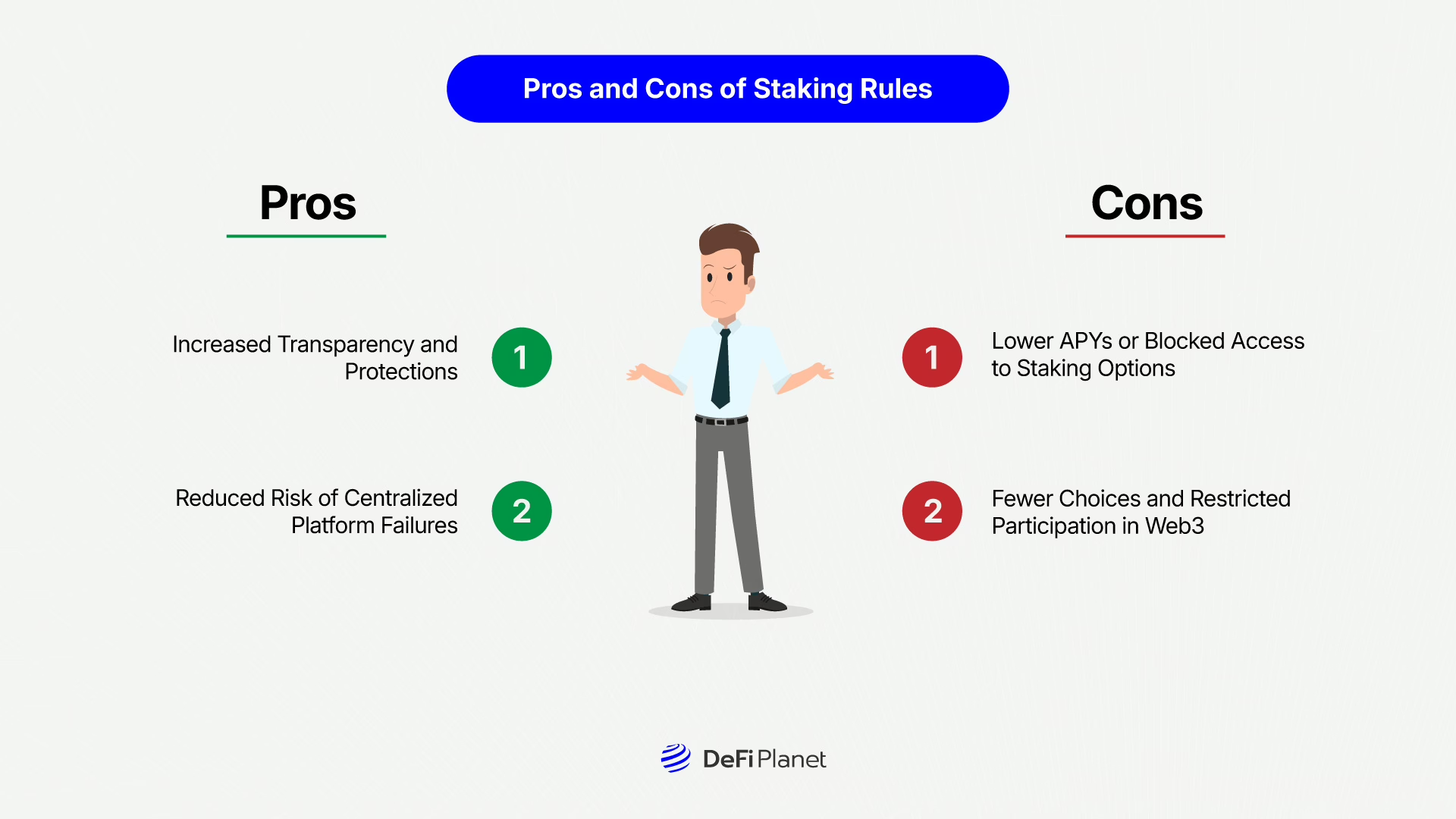
Pros for Investors
-
Increased transparency and protections
These rules aim to create a safer environment for retail investors by requiring clear disclosures and oversight from staking providers. Users are more likely to understand how their assets are being used, how rewards are calculated, and what risks they face—reducing the chance of being misled by opaque platforms.
-
Reduced risk of centralized platform failures
After high-profile collapses like Celsius and FTX, regulatory oversight could help prevent similar disasters. By enforcing compliance and better business practices, the SEC seeks to limit the risk of sudden losses from fraud or poor fund management.
Cons for investors
-
Lower APYs or blocked access to staking options
As platforms face increased legal and operational costs, they may offer lower yields or pull staking services altogether, especially for US users. Investors seeking passive income through staking might find fewer attractive opportunities.
-
Fewer choices and restricted participation in Web3
With some providers exiting the US market or limiting their services to avoid regulation, investors may have fewer staking options. This could restrict broader participation in DeFi and Web3 for everyday users, pushing some toward unregulated or offshore platforms with fewer protections.
What Comes Next for DeFi?
As US regulators tighten the rules around staking services, the DeFi ecosystem is already exploring creative ways to adapt, resist, and evolve in response.
Emphasis on decentralization and governance tokens
In the face of stricter regulation, many DeFi developers are doubling down on full decentralization, designing protocols that minimize reliance on identifiable intermediaries.
By shifting control to governance token holders and DAOs (decentralized autonomous organizations), these projects aim to remove any centralized entity that could be held accountable under securities laws. This approach aligns more closely with the original ethos of DeFi: code-as-law, self-custody, and community governance.
READ ALSO: Is Code Law? The Legal and Moral Implications of Smart Contracts
Innovations to bypass regulatory choke points
Expect new technical solutions aimed at bypassing regulatory bottlenecks. Developers are already working on non-custodial staking tools, cross-chain staking options, and smart contracts that let users earn rewards without handing over control of their assets. These permissionless designs make it harder for regulators to enforce traditional oversight, as there’s no central party operating the service.
Legal battles and lobbying from crypto industry players
Major players in the crypto space, including US-based exchanges and advocacy groups, are preparing to challenge the SEC’s stance in court or through political lobbying.
Legal arguments may hinge on whether certain crypto staking services truly meet the definition of a security. As these legal and regulatory battles unfold, they could set new precedents that shape the future of DeFi ecosystem’s regulatory perimeter.
Role of DAOs and non-custodial services in preserving permissionless staking
DAOs and fully decentralized protocols that offer non-custodial crypto staking are likely to gain prominence. These services allow users to interact directly with smart contracts and maintain full control of their tokens.
Without intermediaries promising fixed yields or pooling customer assets, these setups may fall outside the SEC’s jurisdiction. This could preserve the core functionality of staking while reducing regulatory risk for users and developers alike.
Is the SEC Refining Crypto or Restricting DeFi?
The answer may be both. While clearer guidelines can weed out bad actors and improve trust, overly broad or rigid rules risk stifling innovation and pushing activity offshore or deeper into unregulated spaces. The future of crypto staking and DeFi more broadly depends on finding a better balance.
Users must stay informed and take ownership of their financial decisions. Developers should focus on building resilient, decentralized systems that prioritize user control and transparency. Meanwhile, policymakers must engage the crypto community, crafting rules that protect investors without undermining technological progress.
This is a pivotal moment. Whether staking thrives or withers in the US will depend not just on regulation, but on how the industry and regulators choose to respond.
Disclaimer: This article is intended solely for informational purposes and should not be considered trading or investment advice. Nothing herein should be construed as financial, legal, or tax advice. Trading or investing in cryptocurrencies carries a considerable risk of financial loss. Always conduct due diligence.
If you would like to read more articles like this, visit DeFi Planet and follow us on Twitter, LinkedIn, Facebook, Instagram, and CoinMarketCap Community.
Take control of your crypto portfolio with MARKETS PRO, DeFi Planet’s suite of analytics tools.”

